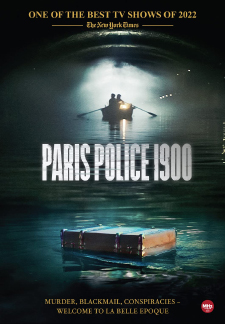Paris Police 1900: Season 1 (DVD Review)

Director
VariousRelease Date(s)
2021 (March 21, 2023)Studio(s)
Canal+ (Kino Lorber)- Film/Program Grade: A-
- Video Grade: B
- Audio Grade: A-
- Extras Grade: F
Review
I was expecting the eight-episode, 438-minute French TV series Paris Police 1900 (2021) to be not much more than a pretty good police procedural, the hook being its period setting. Instead, creator Fabien Nury casts a much wider net, as it is really a historical socio-political thriller covering a wide range of subjects: the fallout from the Dreyfuss scandal, and how rising antisemitism and right-wing extremism threaten the Third Republic; the integration of new technologies and approaches to police work; political corruption and internal strife within the Sûreté; class prejudices, crippling poverty, and the vices of the upper-class; misogyny and emerging feminism, etc., etc.
Paris Police 1900 is figuratively and literally dark, bleakly dark and grim. In just the first few episodes, there are graphic beatings of women and children, scenes of torture, examinations of dismembered corpses, asphyxiation, drug use, onscreen killing of animals (presumably faked), threats of rape and sex scenes pushing the boundaries of even permissive French television standards. Paris at the end of the 19th century had limited electricity—only the rich could afford to have it installed in their homes—so interiors are very dark, even in the daytime, while exteriors reflect a polluted haze of charcoal gray. It’s not a series to watch in a bright room.
It may have been inspired by the success of the German neo-noir series Babylon Berlin, set in 1929. I haven’t seen that program, though the basic premise of Paris Police 1900 also bears more than a passing resemblance to L.A. Confidential. Like that 1997 film, the TV series jumbles real-life historical and fictional characters with much of it revolving around the investigation of a young, determined, newly-promoted detective (Guy Pearce in the movie, Jérémie Laheurte as Antoine Jouin in the series) and a violent, rogue detective (Russell Crowe; Thibaut Évrard as Joseph Fiersi) used as muscle by a corrupt supervisor (James Cromwell; Patrick d’Assumçao as Commissaire Puybaraud) to beat suspects into falsely confessions, steal evidence, etc. Likewise, there’s a beautiful, high-end prostitute (Kim Basinger; Évelyne Brochu as Marguerite Steinheil) connected to the larger story.
Added to this mix is a reform-minded Prefect of Police, Louis Lépine (Marc Barbé), whose unhappy wife (Valérie Dashwood) joins her manipulative society fellow madams in recreational drugs, quickly upping their game to heroin. Jouin also becomes involved with Jeanne Chauvin (Eugénie Derouand), a pioneering feminist, the second woman in France to obtain a law degree (yet legally unable to practice) and the treacherous Guérin family, opportunist anti-Semites, founders of the Antisemetic League of France and publishers of The Anti-Semite (L’Antijuif), a shockingly popular weekly newspaper/anti-Jewish propaganda, who with nationalist and loyalist allies, plot a coup d’état against the republic. Anne Benoît as matriarch Maman Guérin is the most imposing female antagonist this side of Kate Murtagh’s Frances Amthor in the movie Farewell, My Lovely. Indeed, many in the cast make strong impressions, particularly Barbé and Patrick d’Assumçao, both veteran actors.
Not being French, I had only a passing familiarity with the Alfred Dreyfuss case, in which the Jewish French artillery officer was falsely charged and convicted of treason, the real spy working for the Germans being Ferdinand Walsin Esterhazy. Paris Police 1900 had me looking up and checking the authenticity of all these real-life historical characters and incidents, including the opening scene to the entire series, in which French President Félix Faure died while being serviced by Steinheil, an apparently true historical footnote.
More importantly, the series exposes and explores just how intensely and pervasively anti-Semitic France was at the turn of the previous century, including among much of Paris’s police force, and the degree that France’s right-wing used tactics later adopted by the Nazis 30-odd years later. Also intriguing are Lépine’s modernization efforts, often initially scoffed at by the press and his own police force, such as providing telephone lines at all police stations, and having police officers patrol around the city on bicycles.
Kino Lorber’s DVD, licensed from CANAL+, presents the series in 16:9 enhanced widescreen, the program opting for a CinemaScope-like 2.35:1 aspect ratio rather than the standard 1.78:1. As discussed above, the visual design is very dark and murky; on DVD it looks okay, but on my big projection screen I was wishing it were on Blu-ray instead. The series is presented across three single-sided DVDs, with two or three episodes per disc. The Dolby Digital surround sound (French only) is up to contemporary standards, and the English subtitles are good. No extras and Region 1 encoded.
An excellent series if not for the faint-hearted, Paris Police 1900 is enthusiastically recommended.
- Stuart Galbraith IV

